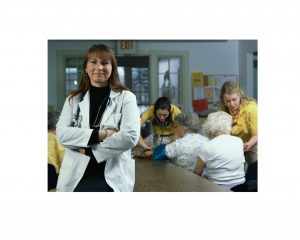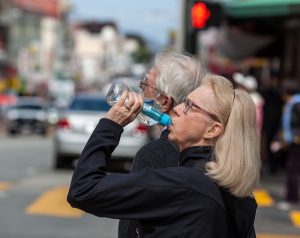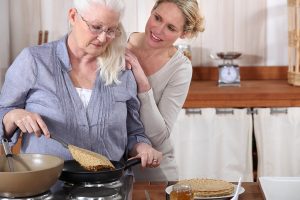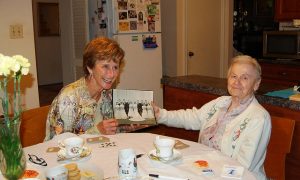Dr. Mauk’s Boomer Blog
Each week, Dr. Kristen Mauk shares thoughts relevant to Baby Boomers that are aimed to educate and amuse.
Dr. Kristen L. Mauk, PhD, DNP, RN, CRRN, GCNS-BC, GNP-BC, FAAN

GERD
Background
Although gastroesophageal reflux disease (GERD) is common among older adults, the true prevalence is not known. Many patients with GERD-related symptoms never discuss their problems with their primary care provider. GERD is thought to occur in 5–7% of the world’s population, with 21 million Americans affected (International Foundations for Functional Gastrointestinal Disorders, 2008). It is found in both men and women.
Signs and symptoms
Pathophysiological changes that occur in the esophagus, hiatal hernia, and certain medications and foods increase the risk for GERD. Obesity (Corely , Kubo, Levin et al., 2007) and activities that increase intra-abdominal pressure such as wearing tight clothes, bending over, or heavy lifting have also been linked to GERD (MedlinePlus, 2005a). The cardinal symptom of GERD is heartburn; however, older adults may not report this, but rather complain of other symptoms such as pulmonary conditions (bronchial asthma, chronic cough, or chronic bronchitis), a hoarse voice, pain when swallowing foods, chronic laryngitis, or non-cardiac chest pain (Pilotto & Franceschi, 2009). The chronic backflow of acid into the esophagus can lead to abnormal cell development (Barrett esophagus) that increases the risk for esophageal cancer.
Diagnosis
Older adults often have atypical symptoms, making the diagnosis of GERD very challenging. As people age, the severity of heartburn can diminish, while the complications, such as erosive esophagitis, become more frequent. Therefore, endoscopy should be considered as one of the initial diagnostic tests in older adults who are suspected of having GERD (Pilotto & Franceschi, 2009). Examination of the esophagus, stomach, and duodenum through a fiber-optic scope (endoscopy) while the person receives conscious sedation, allows the gastroenterologist to visualize the entire area, identify suspicious areas, and obtain biopsies as needed. Helicobacter pylori (H. pylori), a chronic bacterial infection in humans, is a common cause of GERD, affecting about 30% to 40% of the U.S. population. Testing for H. pylori can be done during the endoscopy or by other tests (Ferri, 2011).
Treatments
The objectives of treatment for GERD include: (1) relief of symptoms, (2) healing of esophagitis, (3) prevention of further occurrences, and (4) prevention of complications (Pilotto & Francheschi, 2009). Lifestyle and dietary modifications are important aspects of care. It is widely recommended that persons with GERD should stop smoking, limit or avoid alcohol, and limit chocolate, coffee, and fatty or citrus foods. Medications should be reviewed and offending medications modified, since certain medications decrease the lower esophageal sphincter (LES) tone, allowing acid to backflow into the esophagus. These include anticholinergic drugs, some hormones, calcium channel blockers, and theophylline. Avoidance of food or beverages 3–-4 hours prior to bedtime, weight loss, and elevation of the head of the bed on 6-to-8 inch blocks are some other interventions that may help alleviate symptoms. Pharmacological treatments with antacids in conjunction with histamine 2 (H2) -blockers (Tagmet, Zantac, Axid, and Pepcid) are used for mild GERD. If these are ineffective in controlling symptoms, then the proton pump inhibitors (PPIs) are the next drugs of choice. These include medications like Nexium and Dexilant. With lifestyle modifications and appropriate medications, older adults can manage their GERD symptoms so that quality of life is maintained.
Adapted from Mauk, K. L., Hanson, P., & Hain, D. (2014). Review of the management of common illnesses, diseases, or health conditions. In K. L. Mauk’s (Ed.) Gerontological Nursing: Competencies for Care. Burlington, MA: Jones and Bartlett Publishers. Used with permission.
http://www.mayoclinic.com/health/gerd/DS00967
Seniors and Addiction Rehab: What Do You Need to Know?

There are addiction rehab programs for seniors. Many people don’t consider seniors when they think of someone having an addiction. However, that may be a mistake. There are many seniors who experience chronic pain, grief, and other issues, which is why they may abuse drugs. The schedule will be customized to meet each individual’s addiction recovery needs.
Components of Treatment
It is helpful to know what the components of treatment will be, whether you or a senior in your life, needs to get treatment. Some of these components include the following:
● Group therapy
● Daily assessments
● Pain management
● Medication assessments
● On-site medical detox
● Psychological assessments
● Faith-based counseling
● Relapse prevention tips
● Family therapy
These components may vary depending on the addiction treatment center that is attended. You may also get yoga, physical therapy, exercise, and other treatments.
Symptoms and Signs of Substance Abuse
It can be even more troublesome when an addiction goes unnoticed or doesn’t get treated. This is why it is so essential to recognize the symptoms and signs of substance abuse in seniors. Some of these things include the following:
● Anemia
● Agitation
● Liver function issues
● Anxiety
● Personal cleanliness issues
● Mental ability changes
● Eating habit changes
● Depression
● Increased falls
● Drinking despite consequences
● Weakness
● Fatigue
● Incontinence
● Violence
● Hostility
● Memory lapses
● Irritability
● More confusion than normal
● Losing interest in enjoyable activities
● Not keeping in touch with friends or family members
● Marital issues
● Panic attacks
● Mood swings
● Slurring of speech
If you notice these symptoms and signs in a senior, be sure to try to get them help.
When it comes to seniors and addiction rehab, it is important to know all this information. Addictions can be dangerous for anyone, especially the elderly. Their organs and body systems don’t work as well, so it is much easier to get alcohol poisoning or overdose on drugs. If you are a senior with an addiction, you can get inpatient rehab for elders today.
Guest Blog: 5 Reasons It Is Important for Senior Citizens to Have a Medicare Plan
As we age, it becomes increasingly important to have a solid healthcare plan in place. Medicare is one of the most popular healthcare plans available for senior citizens, and there are many reasons why it is important to have coverage through this program. For instance, Medicare can help to cover the costs of hospital stays, doctor visits, and even prescription medications. Another reason Medicare is so important is that it can help fill in the gaps left by other types of insurance coverage. For example, if you have private health insurance, some services may not be covered by your plan. Medicare can help to cover those costs so that you don’t have to worry about them. Here is a look at five reasons senior citizens need a Medicare plan.
1. Cover the Costs of Hospital Stays
Senior citizens are prone to a variety of health issues that can require hospitalization. These issues include strokes and heart attacks, broken bones, and pneumonia. Medicare can help to cover the costs of these hospital stays, which can be very expensive. If you go without coverage, you may have a large hospital bill you will be responsible for paying. In cases where a senior citizen is sent to a nursing home after a hospital stay, Medicare can also help cover the stay’s costs.
2. Cover the Costs of Doctor Visits
As we age, we tend to see the doctor more often. This is due to various health issues that can come up as we get older. For instance, we may need to see the doctor for routine checkups and more serious problems. Medicare can help cover the costs of these doctor visits, saving senior citizens a lot of money. In addition, Medicare can also help to cover the costs of preventive care, such as mammograms and screenings for colon cancer. You don’t want to go without this coverage, as it could cost you a lot of money in the long run.
3. Cover the Costs of Prescription Medications
Another important reason senior citizens need to have a Medicare plan is that it can help cover the costs of prescription medications. As we age, we tend to take more prescription medications than we did when we were younger. This is due to various health issues that can come up as we get older. Medicare can help cover the costs of these medications, saving senior citizens a lot of money. Medicare can also help cover the costs of generic medications, which can be even cheaper than brand-name medications. However, it is important to note that Medicare covers not all drugs. You will need to check with your specific plan to see what is and is not covered.
4. Cover the Costs of Vision and Dental Care
Another important reason senior citizens need to have a Medicare plan is that it can help cover the costs of vision and dental care. Senior citizens need to see the dentist more often than they did younger. This is due to various health issues that can come up as we get older. Additionally, senior citizens often need glasses or contact lenses as they age. Medicare can help cover the costs of these vision and dental care services, saving senior citizens a lot of money.
5. Cover the Costs of Hospice and Home Health Care
Finally, another important reason senior citizens need to have a Medicare plan is that it can help cover the costs of hospice and home health care. Omaha Insurance solutions understand that the end of life can be difficult for individuals and their families and they make it easier to pick a medicare plan that will help with any cost there might be. Insurance companies offer hospice and home healthcare coverage through different medicare plans. Hospice care can help to provide comfort and support for those nearing the end of their life. Home health care can help provide care for those unable to care for themselves. This coverage can be very beneficial for the individual and their family.
Conclusion
There are many reasons why senior citizens need to have a Medicare plan. If you or someone you know is a senior citizen, it is important to ensure that you have a plan. Omaha Insurance can help you to find the right Medicare plan for your needs.
Guest Blog: Romance can spark retirement planning
Romance is an exciting prospect to pursue during the retirement years. In fact, a study conducted by Merrill Lynch and Age Wave revealed that 69% of retirees find romantic activities a priority during the golden years.
Of course, proper retirement planning is needed in order for couples to make time for love. It can’t be stressed enough that 70% of people age 65 years and above is expected to receive some form of long term care in the future. And a long term care insurance (LTCI) basically covers that particular need.
Now, the great thing about planning early for long term care is that not only will partners be able to receive care when they need it. Couples preparing together can also strengthen their relationship. A stronger bond with each other effectively prevents any arguments that spouses may encounter in the future. Planning, in a way, sets one’s hopes and expectations for the romantic ride in the next couple of years.
As a couple, setting your sights on some romantic retirement activities can be a motivational tool for you both to prepare for your tomorrows. Here are some suggestions you may want to do together:
Travel
Experience unforgettable moments by exploring new places. It doesn’t need to be far – the important thing is you’re together in a strange and exciting place!
Higher Education
Bring back the wonders of school romance by pursuing higher education. Aside from having the chance to pass love notes in class, the knowledge gained from school can be used for possible business opportunities during retirement.
Movies
Retirement means more time with each other. So grab some popcorn and enjoy watching some romantic movies together.
Cooking
Food is the way to a man’s (or even a woman’s) heart. Enjoy whipping up some meals for each other.
Health
Keeping fit is better when done with a partner. Even something as simple as walking together in a park should keep you and your date fit and happy.
Go on a Date
Even single retirees can join in the fun. Retirement can be a good time to meet, mingle, and spend time with a new and special friend.
And the list goes on. No matter which activity you and your spouse may want to do, an LTCI will grant the security in case something dire happens. Make sure to get a suitable LTC coverage for your romantic retirement getaways today.
Author Bio: Violet Swenson is the Online Content Director at LTC Global Agency, a reliable provider of long term care insurance since 2002. Our strong partnerships with top companies across the country help us deliver the most competitive products in the industry.
Guest Blog: How Do Seniors With Alzheimer’s Handle Change?
When seniors develop diseases affecting cognition, like the various kinds of dementia, caregivers typically make an effort to make their living environment as safe and comfortable as possible. Sometimes caregivers make lots of changes to a senior’s living space, with the best intentions of helping them. However, this can have a two-sided effect, because seniors with mentally deteriorating illnesses can find change to be a confusing or frightening thing. Caregivers might change the entire layout of a house, remove everything that could be a hazard, or add numerous locks to provide security. Changes like these can actually prove to be disorienting for a senior, in addition to being helpful. So the question becomes, how much change can seniors with Alzheimer’s handle?
It’s typical to find instances where seniors have lived in the same home for decades, and have a curious ability to navigate the living space with a sort of muscle memory after memory-harming diseases like Alzheimer’s set in. Routine is very important to the delicate psyche of an elder with dementia, so finding the perfect balance of what to change for their own good can be tricky. Making abrupt overwhelming makeovers to their home’s layout can make them flustered and end up actually making it more difficult for them to get around, adding to their impaired cognition. So it is best to maintain an environment that is familiar as much as possible. And make any alterations subtly and slowly over time.
The necessity to make changes will depend of the severity of a senior’s individual case. If the Alzheimer’s is in the mid to late stages and a senior is wandering out of the home constantly, then immediate action to prevent hazard is surely appropriate. Installing door alarms or adding locks can be great helps. If a senior with dementia typically kept a messy household, then the mess may add to their unease or make it easier to trip and fall. De-cluttering their living space can be advantageous in these cases.
Thus, change will surely be necessary at times. Though it is advisable to make changes as gradually and calmly as possible, to avoid overwhelming or distressing what was comfortable, normal, and assuring to the mind of a loved one with dementia. Routine is key for security in these instances. It may also be helpful to make sure you let them see when you move something, or set their things some place, to help then more easily adapt to the change.
Guest Blog: Tips for Making a Home Safer for Seniors
With growing age, keeping up with daily activities can become difficult. Aging seniors cannot do basic chores like cooking and cleaning and even moving around in their homes can sometimes become difficult. Taking care of your aging parents is a noble task, but due to current lifestyles, it has become challenging for children to take care of parents. Since you cannot be with them 24/7, you can change at home to make their lives easier and to avoid accidents. The good news is, now you can get help with your senior care in Dallas or any other city across cities across the nation. There are great options for senior care to simplify and improve your life, putting everyone’s mind at ease.
Here are five of the top things you can do to make life easier for seniors living in their own homes.
- Create a fall free zone.
Older people have increased risks of falling or slipping even from the smallest things. The following simple changes can reduce the chances of tripping:
- Install a cordless or cell phone instead of using a traditional telephone.
- Remove throw rugs from the home, as they can be hazardous for people using walkers.
- Place electrical cords for the TV, modem, and telephone should correctly to avoid tripping.
- Obtain an alarm bracelet or necklace that sends alert to emergency services with a push-button.
- Encourage the use of a cane or a walker at all times instead of holding onto walls and furniture.
- Purchase non-slippery footwear or flat, thin-soled shoes that fit well.
- Change floorings from tiles to wooden.
- Create a secure place for pets, so that they do not clutter things in the hallway or the living room.
- Teach older adults fire safety tips
The kitchen is a potential area where seniors are at risk of getting burnt. Here are things you can do to prevent danger from fire:
- Set up the kitchen so that everything is easily accessible.
- Install a smoke detector and check its battery regularly.
- Replace faulty appliances.
- Avoid putting too many electrical wires in one socket.
- Instruct them to call 911 to put out a fire.
- Instruct them to avoid smoking in bed.
In case you feel that getting a caregiver is a better resource for your aging parents, you may contact a trusted provider for senior care in Dallas or your local area.
- Reduce the risk of bathroom slips and falls.
A risk assessment of the bathroom identifies the potential dangers of slips and falls and highlights any further controls needed to ensure seniors’ safety.
- Set the water heater at no more than 120 degrees Fahrenheit to prevent scalding.
- Add support and grab bars in the bathing area and near the toilet to assist more natural movement.
- Place a rubber mat in tubs to avoid slips due to water.
- Install chairs and bars in the tubs to reduce the risk of falling in the bathroom.
- Install better lighting or sensory lights in hallways and bathroom areas.
- Protect them from strangers.
Older adults are an easy target for scams and crime. You can protect them from these risks by teaching them a few tips:
- Don’t welcome strangers in the house for any reason.
- Don’t be fooled by strangers in uniform or with an identification badge. Call 911 immediately.
- Install security cameras and an alert system so they as well as you can check who is at the door.
- Teach your loved ones the emergency contact information.
- Tell them not to give personal information on the phone.
- Arrange for in-home caregiver services.
Most cities and towns across the United States (New York, D.C., Seattle, Phoenix, etc.) now offer in-home caregiver services through agencies like Ultimate Home Health Care in Dallas, Texas. This is a convenient service, because you can simply call to arrange 24/7 caregiver support, just when you need it. That means your aging parents or grandparents can maintain their independence and stay in thir home longer, getting expert care with all of the comforts they enjoy.
Senior care in Dallas is only a phone call away and is always available for your aging parents or grandparents. Ultimate Home Health Care is a great agency to consider for seniors in the Dallas area. Ultimate provides the best 24/7 caregiver services sent directly to the homes of seniors in need of help throughout the DFW area in North Texas. From cooking meals to providing transportation to social events, you can trust Ultimate Home Health Care’s caregivers to assist your parents with love and care.





